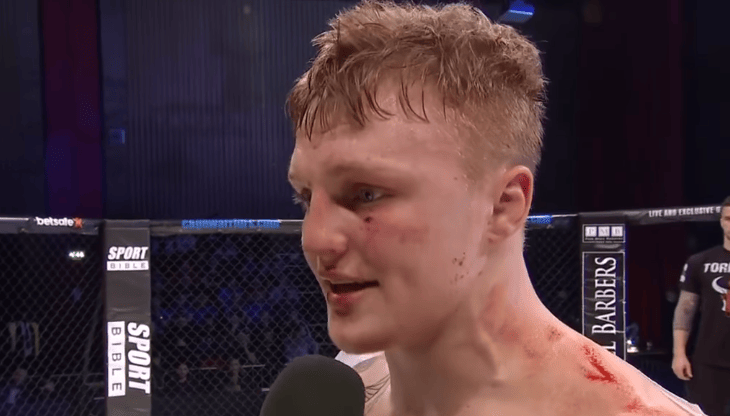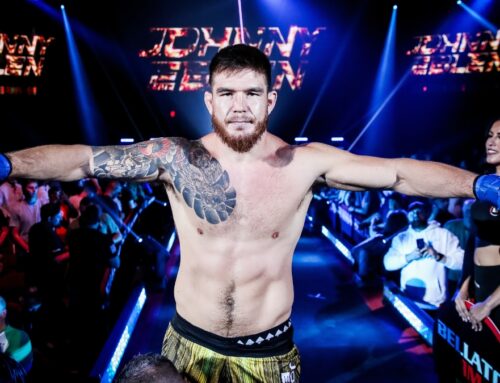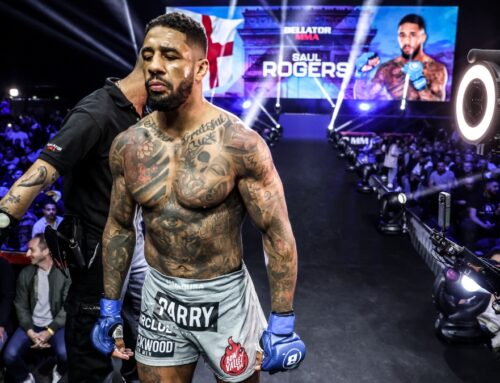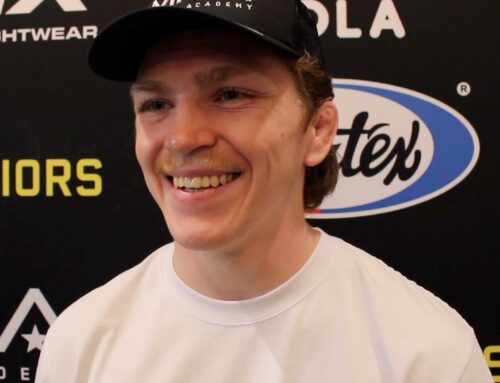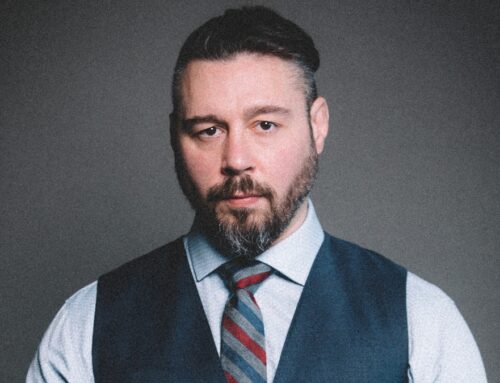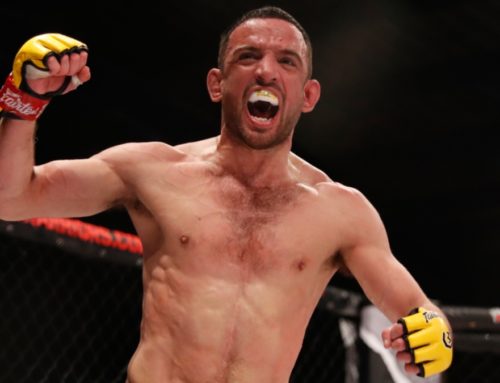By Alistair Hendrie
At a time when plenty of fighters fall into debt, depression or drink after retiring, it’s refreshing to learn that Mason Jones, the young Welsh lightweight with his head screwed on, is already planning for the future. “It’s silly to not have an exit plan,” he says. “If you’re fighter who hasn’t been saving their purses and building up savings, why haven’t you? My dad has always encouraged me to look after my finances and if things go to plan I’ll be investing before I retire. Then once I’m done, I’ll have enough money to avoid the 9-5 and not worry about money. I want to have a comfortable lifestyle.”
Jones, though, stresses he’s not in MMA purely for the money. “I’ll get rich one day, I know I’m good enough, but I’m not in it for that. I do the sport because I want to be the best possible fighter, not just for the money – that’s just an aside.”
As well as considering endeavours away from the fight game, Jones has built a record of 7-0 once the cage doors close. The judoka thrilled fans with decisions over the likes of Konmon Deh and Donovan Desmae, hurling combinations at will and chasing advantages from the guard too. Those performances have helped him succeed Jack Shore as Cage Warriors’ poster boy for Wales, and Jones is now deep in camp for his Cage Warriors 108 main event against Aleksi Mantykivi on Saturday in Cardiff.
“I love fighting in front of a home crowd,” says Jones. “Pressure? No. More excitement? Definitely. I’m just trying to stay calm because I’m so excited. I look forward to it so much. It’s what I love to do. I don’t have any second thoughts and I don’t have any other hobbies; I’m always in the gym and MMA is all I do.”
It seems the 24-year-old has inherited his work ethic from his family. His father, Paul Jones, earns multiple streams of income through property, a scaffolding firm and a woodwork shop. His brother, Corey Jones, is also involved in the family empire.
“My father is an absolute master at investments,” laughs Mason, the admiration evident in his voice. “He’s so smart and has encouraged me a lot to look at the financial side of my career. He’s encouraged me to think of MMA in terms of it being a career path for me, which it is.”
It was dad Paul who first ushered Jones into fighting. “I’ve been in combat sports since I was about seven when my dad heard about a kickboxing gym in Ebbw Vale called Falcon. I went along because there were no other gyms in the area – that’s just the way it was. They did a lot of freestyle jiu jitsu and ground-fighting. Then, when I was about 12, dad suggested I try judo.”
Jones discovered his niche on the judo mats. On Fridays, he sacrificed school to compete in judo tournaments across Wales and ended up winning British and European medals, frequently rubbing shoulders with UFC bantamweight Brett Johns. His talent and smarts helped him qualify for the Welsh Commonwealth Games squad in 2014. Still, injury put paid to his hopes of competing. “I don’t tell people about the injury,” chuckles Jones, his guard up. “We’re in a brutal sport and people will use any advantage.”
The intelligent prospect, training with the likes of Craig Ewers and Stephen Gifford across south Wales, has all the tools to become a star in the UFC and perhaps that is down to his striking prowess. He throws his jab from unique angles and zips in and out of range with malice.
Indeed, after his Commonwealth Games disappointment, Jones sharpened his handiwork in professional boxing, going 3-0 between July 2016 and January 2017. “The whole reason I started boxing is because in MMA the highest rewards are for those who are good with their hands.” A clever statement, once again.
Soon, though, he became disillusioned with boxing. “Boxing is such a beautiful sport but it’s all about the money. I’d be selling 100 to 150 tickets for each fight, and then the events would get cancelled left, right and centre. I’d be paying coaches, taking money for tickets, cutting weight and doing a full fight camp and then the shows would fall through. There’s no respect in boxing but in MMA they treat you better.”
Indeed, Mason has found a home in MMA since turning pro in October 2017, almost a year after Jack Marshman became the first Welshman to grace the UFC. Despite his youth, emphasised by his fresh-faced appearance, Jones and his coaches have developed a crafty system for fight prep in which everything is scrutinised, whether it’s opponent analysis, training statistics, sparring sessions or sleep patterns. “The only difference in being the main event is that I have to sleep in later during fight week, so I can peak on the night at around 10.30-11pm,” says Jones, always looking for that extra few percent.
Saturday will be Jones’s first headline match-up, however, and Mantykivi holds the upper hand in seasoning, racking up a 13-5 record since 2012, defeating the likes of Soren Bak, the former Cage Warriors titlist. The Finn will come for war, says Jones, and should provide conundrums.
“He brings a continuous advancing style and he’s dangerous with his leg kicks, body kicks and big right hands. I just think I’ll be too much for him. As long as I stay away from his right hand I think it’s an easy win for me. I don’t think he’ll be able to deal with my pressure or striking, so it’s going to be an interesting night.”
With Jones as Wales’ most alluring talent and no doubt one of the most watchable fighters in Europe, “interesting” is an understatement. If he has his way, Saturday won’t be the last time he electrifies his home crowd. “The UFC will be back in Wales and I’m hoping to one day be on that card. I think we’ll be filling out stadiums in Wales soon and I thrive under that kind of pressure, walking out into a home crowd and having everyone with me.”
Surely there’s more to come from Mason, then? “Well, I don’t think I’ll ever reach a full amount of potential, I’ll just keep getting better and better until eventually I’ll be a threat to everyone. You’re going to see better versions of me throughout my career. After I win this fight I can take on and beat tougher opponents. I love that mentality, that whole mindset of trying to dismantle opponents – not just beat them, but tear them apart. Reaching the UFC is just a matter of time for me and I’m going to keep climbing the ladder to the UFC and beyond.”
Check out more of Alistair Hendrie’s work with his Kindle book, Fight Game: The Untold Story of Women’s MMA in Britain, which features insight from Rosi Sexton, Joanne Calderwood and many more.

